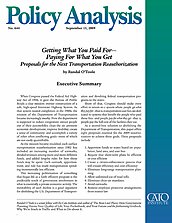As the mission became muddied, each surface transportation reauthorization since 1982 has included an increasing number of earmarks, divided revenues among more and more different funds, and added lengthy rules for how those funds may be spent. Each earmark, apportionment, and rule has made transportation spending incrementally less efficient.
This increasing politicization of something that began life as a fairly efficient program is the predictable result of government involvement in what is essentially a private economic activity. The inevitability of such decline is a good argument for abolishing the U.S. Department of Transportation and devolving federal transportation programs to the states.
Short of that, Congress should make every effort to return to a system where people get what they pay for — that is, transportation user fees are dedicated to systems that benefit the people who paid those fees — and people pay for what they get — that is, people pay the full cost of the facilities they use.
As a second-best solution to abolishing the Department of Transportation, this paper offers eight proposals essential for the 2009 reauthorization to achieve these goals. These proposals include
- Apportion funds to states based on population,
- Require that short-term plans be efficient
- Create a citizen-enforcement process that
- Eliminate long-range transportation planning
- Allow unlimited use of road tolls
- Eliminate clean-air mandates
- Avoid earmarks
- Remove employee protective arrangements from transit law
land area, and user fees
or cost efficient
will ensure efficiency and cost efficiency


